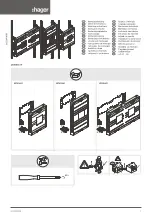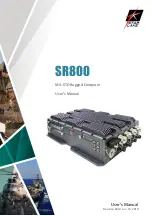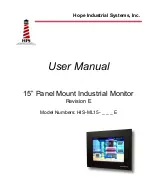
c
·�·
Polyphase Switchboard Watthour Meters
GEH7 64A8
The effect of light-load adjustment varies inversely
with the load. For example, a 5 per cent change at
1/10 full-load current changes the calibration at full
load current approximately 0.5 per cent.
INDUCTIVE LOAD (WAlTHOUR STATORS)
The inductive-load adjustment is made by turning
the screw located to the left of the light load adjusting
screw. Turning the screw counterclockwise increases
the speed of the meter and clockwise decreases it.
If the lag plate is moved, full and light load should
be checked.
Meters furnished for 25- and 30-cycle service some
times are provided with an adjustable compensating
coil. The purpose of this coil is to give additional
range of adjustment for calibrating the meter at
inductive loads.
The two ends of the figure-eight compensating coil
are extended beyond the meter stator and are connect
ed by an adjustable slider soldered in position. The
wires are covered with insulation tubing and both
slider and wires are protected by an outer sleeving.
These adjustable ends of the coils are located along
the edge of the back side of the meter frame.
These meters are adjusted in the factory so that
the front screw adjustment for inductive loads
provides a range sufficient for most conditions of
operation.
Should it be necessary to change this
range, its limits can be raised or lower�d by means of
the adjustable compensating coil. The procedure is
outlined below:
1.
Remove the outer sleeving and inner insula
tion tubing, unsolder the sliding connector and move
it to the desired position.
Move the connector away from the stator to in
crease the speed of the meter and toward the stator
to decrease it.
2.
Resolder the connector carefully in its new
position.
Allow the connector and wires to cool to room
temperature before checking the meter, so its calibra
tion will not be affected by the increased resistance of
the coil due to heating.
3. When the connector has been set in its final
position, reinsulate the wires with the proper tubing
and replace the outer protective sleeving. Care should
be taken to locate the butt joints in the tubing so they
are not opposite each other or a section of bare wire.
Adjustments Between Stators
Equalizing the torque of the stators may be accom-
plished from the front of the meters and without
disturbing any of the parts.
The meter stators are balanced at the factory, but
if \� is necessary to make any change loosen the lock
m
it
,
turn the adjusting screws an equal amount in the
same direction, then tighten the lock nut. Turning
clockwise decreases and counterclockwise increases
the torque of the stator.
READING THE METER REGISTER
The meter register is of the dial type and is normal
ly furnished with a register ratio so that it reads in
primary kilowatt-hours.
On meters measuring a large amount of power and
equipped with a "primary-reading" register a dial-face
multiplier is printed below the dials.
For a "secondary-reading" register the actual read
ing must be multiplied by a constant which is the
ratio of primary energy to secondary energy, that is,
usually the product of the current and potential trans
former ratios of the instrument transformers used
with the meter.
Facing the meter, one revolution of the extreme
right pointer equals 10 kilowatt-hours; one revolution
of the second, 100 kilowatt-hours, etc., except in the
case of meters which have a dial-face multiplier.
One division of a circle, it will be seen, corresponds
to one tenth of the total amount indicated by one
complete revolution of the pointer.
In deciding upon the reading of a pointer, the point
er before it (to the right) must be consulted. Unless
the pointer has reached or passed the "0" or, in other
words, completed a revolution, the other has not com
pleted the division on which it may appear to rest.
For this reason ease and rapidity are gained by read-
Guide
bushing
Jewel
Fig.
1.
I level
Oiltight jewel screw
Jewel
setting
plug
5
www . ElectricalPartManuals
. com
www
. ElectricalPartManuals
. com






































